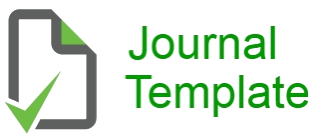Pengaruh Penggunaan Strategi Pembelajaran Aktif Tipe Giving Question and Getting Answer Terhadap Hasil Belajar Matematika Siswa Sekolah Dasar
Abstract
This study aims at determining the effect of the use of an active learning strategy type of giving questions and getting answers on the mathematics learning outcomes of elementary students. This research is under Non-equivalent Control Group Design of Quasi Experimental Design where purposive sampling is used as sampling technique. The population of this study consists of 44 students with observation, tests, and documentation used as the data collection technique. The research instrument used are test of learning outcomes and observation sheets. The normality test was done by calculating the data in the form of pre-test and post-test mathematics learning outcomes using the Kolmogorov Smirnov formula with a sig level of 5% (0.05), after the data was normally distributed, the homogeneity test obtained from the post-test calculations, then hypothesis testing with t-test using the calculation of students’ post-test data. The results of data analysis shows that the value of sig 2 tailed is 0.000, which is less than 0.05, thus, based on the research hypothesis, if the value of sig 2 tailed ≤ 0.05 t-table, then Ho is rejected and Hₐ is accepted. This shows that there is an effect of using an active learning strategy with the type of giving questions and getting answers on the mathematics learning outcomes of elementary students. The results of this research are expected to be used as a reference for further research on different subjects.
References
Depdiknas. 2003. Undang-undang Republik Indonesia No.20 Tahun 2003. Tentang Sistem Pendidikan Nasional.
Faisal, M., Asrin., Jaelani, A. K. (2021). Pengaruh Model Pembelajaran Reciporal Teaching Berbantuan Media Visual Terhadap Hasil Belajar Peserta Didik Kelas IV Gugus V Manggelewa Tahun Ajaran 2020/2021. Jurnal Ilmiah Profesi Pendidikan, 6(4) DOI: https://doi.org/10.29303/jipp.v6i4.351
Hamzah B.Uno. 2018. Model Pembelajaran. Jakarta :Bumi Aksara.
Muammar, H. 2015. Model Pembelajaran Assure dan Pengetahuan Awal Terhadap Hasil Belajar IPA-Fisika Siswa Kelas VII SMPN 22 Mataram. Jurnal Pendidikan Fisika dan Teknologi (ISSN). 2407-6902
Munarawah, I., Jaelani. A. K., Turmuzi. M. (2022). Penderapan Model Team Assited Individualization Pada Hasil Belajar Matematika Siswa Kelas V SDN 1 Bagik Polak Barat. Jurnal Ilmiah Mandala Educaation (JIME).
Nonita, E. S., Nurhasanah, N., & Jaelani, A. K. (2021). Pengaruh Penerapan Model Pembelajaran Reciporal Teaching terhadap Hasil Belajar Muatan IPS Siswa Kelas IV di SDN 10 Mataram Tahun Ajaran 2021/2022. Jurnal Ilmiah Profesi Pendidikan, 6(3) DOI: https://doi.org/10.29303/jipp.v6i3.245
Purwanto. 2016. Evaluasi Hasil Belajar. Yogyakarta : Pustaka Belajar.
Riduwan. 2016. Dasar-dasar Statistika. Bandung : Alfabeta.
Riduwan. Sunarto. 2017. Pengantar Statistika Untuk Penelitian Pendidikan, Sosial, Komunikasi, Ekonomi. Bandung : Alfabeta.
Silberman, Melvin L. 2012. 101 Cara Belajar Siswa Aktif. Bandung : Nuansa.
Siregar, Syofian. 2017. Metode Penelitian Kuantitatif. Jakarta : Kencana.
Sudjana, Nana. 2017. Dasar-dasar Proses Belajar Mengajar. Bandar Lampung : Universitas Lampung.
Sugiyono. 2017. Metode Penelitian Pendidikan. Bandung : Alfabeta.
Suprijono, Agus. 2017. Cooperative Learning Teori dan Aplikasi PAIKEM. Yogyakarta : Pustaka Pelajar.
Susanto, Ahmad. 2016. Teori Belajar dan Pembelajaran di Sekolah Dasar. Jakarta: Prenada Media Grup.
Widoyoko, Eka Putro. 2017. Teknik Penyusunan Instrumen Penelitian. Yogyakarta : Pustaka Belajar.
Wijayanti, Rina. 2017. Pengaruh Metode Giving Question and Getting Answer Terhadap Hasil Belajar Biologi dikelas X SMA Negeri Nibung Tahun Pelajaran 2016/2017. Sumatera Selatan : STKIP/PGRI Lubuk Linggau.







